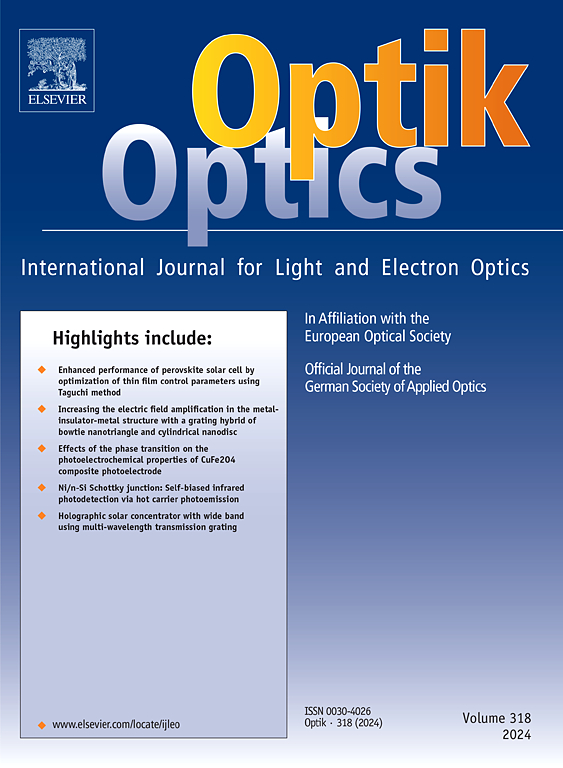Integrated all-fiber-optic sensor based on FPI and MZI composite structures for temperature and strain measurement
IF 3.1
3区 物理与天体物理
Q2 Engineering
引用次数: 0
Abstract
In this paper, a temperature and strain sensor based on fiber-optic Mach-Zehnder interferometer (MZI) cascaded with Fabry-Perot interferometer (FPI) is designed and fabricated. The integrated sensor structure consists of no-core fiber (NCF) sandwiched by two sections of multi-mode fiber (MMF), hollow-core fiber (HCF), and two single-mode fibers (SMF) which are cascaded at the ends of the MMF and the HCF. Due to the thermal expansion effect, thermo-optic and elasto-optic effects of fiber material, the increase of the temperature and strain will make the change of the transmission mode, which will cause the spectral fringes wavelength shifting with strain, and the intensity of the spectral fringes varying with temperature but not strain variations in multiple temperature ranges. The series experiments valid show that the sensor with integrated structure realizes the strain and temperature measurements in multiple temperature ranges, and the minimum and maximum temperature sensitivities are − 0.278 dBm/°C and − 0.670 dBm/°C in the temperature range of 68–86 °C and 123–141 °C, respectively. The strain sensitivity is 2.17 pm/με all over the measured range. The integrated sensor structure has the advantages of high sensitivity, multiple measuring ranges, simple manufacturing, and low cost, which has the potential to be applied in the field of the internal strain and temperature measurements of different structures.
基于 FPI 和 MZI 复合结构的集成式全光纤传感器,用于温度和应变测量
本文设计并制作了一种基于光纤马赫-泽恩德干涉仪(MZI)与法布里-珀罗干涉仪(FPI)级联的温度和应变传感器。集成传感器结构由两段多模光纤(MMF)夹着的无芯光纤(NCF)、中空芯光纤(HCF)和两根单模光纤(SMF)组成,这两根单模光纤级联在多模光纤和中空芯光纤的两端。由于光纤材料的热膨胀效应、热光学效应和弹性光学效应,温度和应变的增加会使其传输模式发生变化,从而导致光谱条纹波长随应变移动,光谱条纹的强度随温度变化而变化,但在多个温度范围内不随应变变化。系列实验结果表明,集成结构的传感器可在多个温度范围内实现应变和温度测量,在 68-86 ℃ 和 123-141 ℃ 温度范围内,最小和最大温度灵敏度分别为 - 0.278 dBm/℃ 和 - 0.670 dBm/℃。在整个测量范围内,应变灵敏度为 2.17 pm/με。该集成传感器结构具有灵敏度高、测量范围多、制造简单、成本低等优点,有望应用于不同结构的内部应变和温度测量领域。
本文章由计算机程序翻译,如有差异,请以英文原文为准。
求助全文
约1分钟内获得全文
求助全文
来源期刊

Optik
物理-光学
CiteScore
6.90
自引率
12.90%
发文量
1471
审稿时长
46 days
期刊介绍:
Optik publishes articles on all subjects related to light and electron optics and offers a survey on the state of research and technical development within the following fields:
Optics:
-Optics design, geometrical and beam optics, wave optics-
Optical and micro-optical components, diffractive optics, devices and systems-
Photoelectric and optoelectronic devices-
Optical properties of materials, nonlinear optics, wave propagation and transmission in homogeneous and inhomogeneous materials-
Information optics, image formation and processing, holographic techniques, microscopes and spectrometer techniques, and image analysis-
Optical testing and measuring techniques-
Optical communication and computing-
Physiological optics-
As well as other related topics.
 求助内容:
求助内容: 应助结果提醒方式:
应助结果提醒方式:


